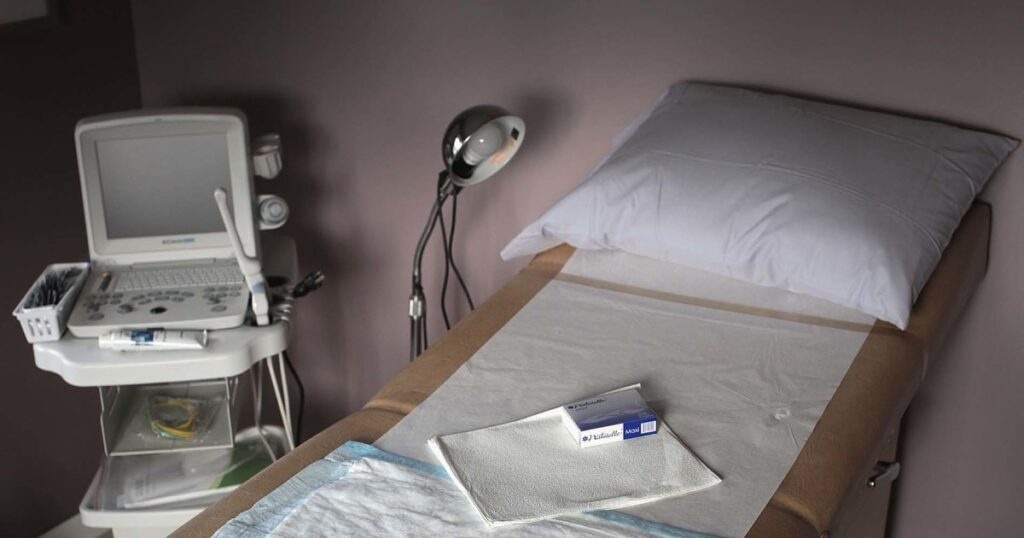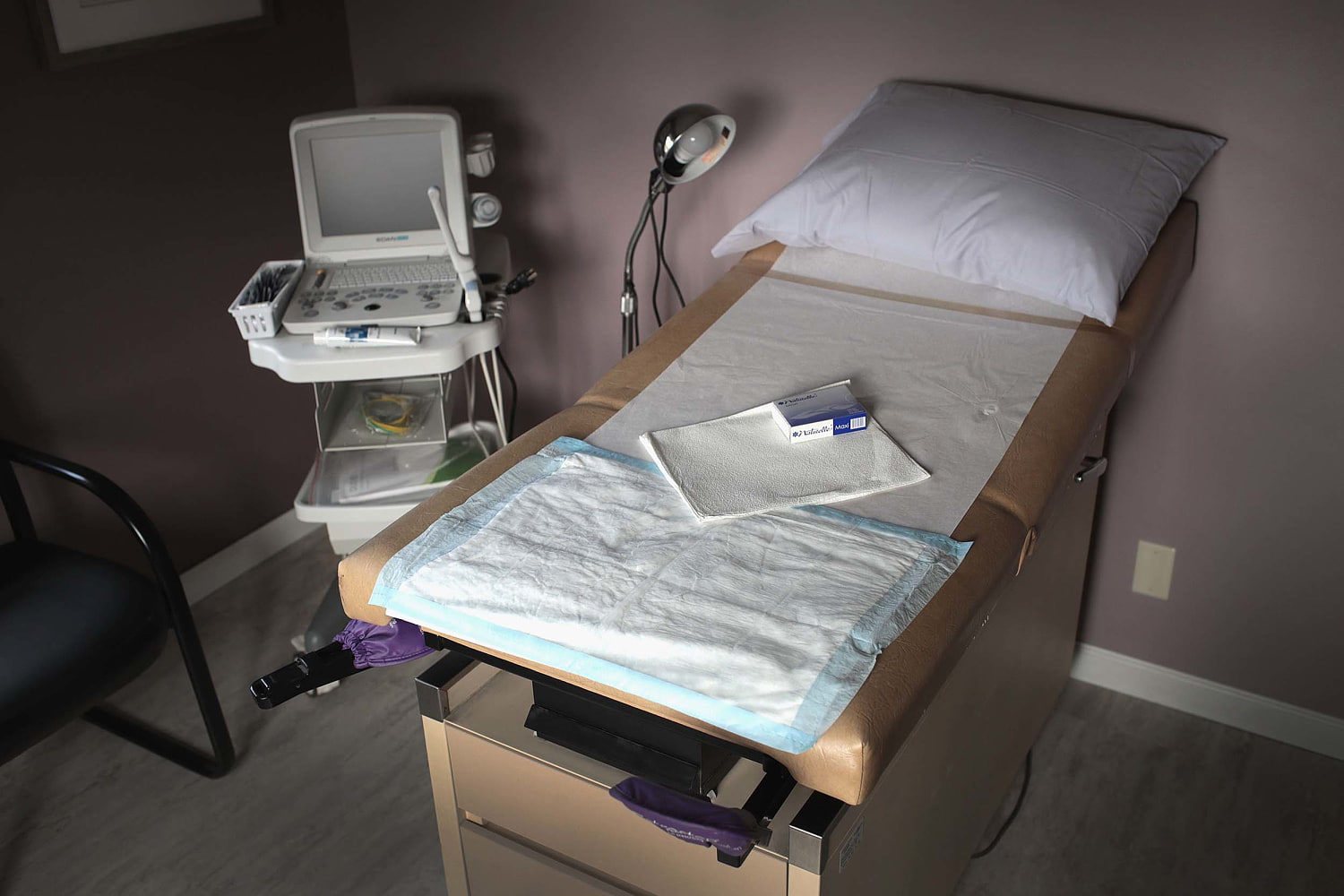

One of the largest crisis pregnancy center support groups in the United States is telling its member clinics to avoid performing prenatal ultrasounds on women who they suspect have ectopic pregnancies, according to recordings obtained by NBC News of a recent presentation by a legal group that advises the faith-based nonprofits. The guidance comes in the wake of a lawsuit against a Massachusetts center that misdiagnosed an ectopic pregnancy.
The National Institute of Family and Life Advocates (NIFLA), a group that provides legal support and medical training for crisis pregnancy centers, advised members at a meeting earlier this year to proceed with caution when giving an ultrasound to a woman they suspect may have an ectopic pregnancy, calling the condition “the greatest medical and legal risk for clinics,” according to the recordings of the presentation that NBC News obtained via a conference attendee.
“I do not want to see on any website or advertising is, ‘Come to us and we’ll rule out an ectopic,” said a representative for NIFLA. “It is impossible to rule out an ectopic unless you’re doing HCG,” they added, referring to a blood test that measures hormone levels to confirm a pregnancy.
In the Massachusetts lawsuit filed in 2023, a crisis pregnancy center was accused of failing to diagnose an ectopic pregnancy and causing a life-threatening emergency for a client. The complaint alleged that Clearway Clinic engaged in deceptive advertising, aiming to persuade women to forgo abortions rather than “providing them with the range of medically appropriate options.”
The plaintiff, a Worcester resident who was kept anonymous in the suit, alleged that the nurse who performed her ultrasound scan at the center “did not undertake sufficient medical measures” to ensure the pregnancy was viable. The suit alleges that the woman’s fallopian tube ruptured about a month after the ultrasound scan, “causing massive internal bleeding and necessitating emergency surgery.”
After a favorable lower court ruling for the plaintiff, the crisis pregnancy center settled the case in June 2024 without admitting liability.
Crisis pregnancy centers operate across the United States with the goal of persuading pregnant women to continue their pregnancies. Many open close to abortion clinics, promoting family planning services and limited health care services such as pregnancy tests and ultrasounds. Many generally don’t offer regular prenatal checkups or gynecological services, nor do they offer abortion procedures, abortion medications or care for women having miscarriages.
According to Andrea Swartzendruber, a reproductive health epidemiologist at the University of Georgia College of Public Health who studies crisis pregnancy centers, many centers have advertised free ultrasounds as a way to diagnose an ectopic pregnancy and bring women through their doors.
“They talk about ectopic pregnancies in their advertising and on their websites a lot,” said Swartzendruber. “They use it to engage and try to motivate people to come in for an ultrasound.”
An ectopic pregnancy occurs when a fertilized egg implants and grows outside the uterus. While the condition is rare, affecting only 1% to 2% of pregnancies, it can be life-threatening. Early in a pregnancy, symptoms can include vaginal bleeding or mild pain or cramping, but women may not realize they’re experiencing an ectopic pregnancy at that stage. The condition is diagnosed by either an ultrasound, a pelvic exam or a blood test.
Some of the cases NIFLA has represented clinics in have made their way to the Supreme Court, including a 2018 case that handed a major First Amendment win to crisis pregnancy centers in California. While NIFLA did not represent Clearway Clinic in the Massachusetts case, the center was listed as a member in 2023.
“Just as I’m walking down here I had a call from a center,” said one of the lawyers on the recording, recounting a story of a clinic that suspected a client had an ectopic pregnancy. “They had a woman come in who was cramping, and she said on a scale of 1 to 10, it was just below a 6. And I’m like, yikes, like, I wouldn’t scan her.”
The lawyer acknowledged the correct move would be to send the client to the emergency room.
NIFLA has issued similar guidance to its member centers in the past. A 2018 document titled “Medical Policies and Procedures” advises centers that “if a patient has symptoms of an ectopic pregnancy or miscarriage, she will not be offered an ultrasound exam and is advised, verbally and in writing, to immediately obtain medical care.”
According to Swartzendruber, that guidance is not always heeded by the industry.
“That seems like a very marked change, especially given that so many CPCs are using fear around ectopic pregnancy as a reason to come in and get scanned,” she said.
NIFLA did not respond to multiple requests for comment.
NIFLA training materials presented at the meeting and obtained by NBC News say these health services create “access points” to “help prevent unintended pregnancies and intervene in the lives of individuals who are most abortion vulnerable.”
According to the American College of Obstetricians and Gynecologists, crisis pregnancy centers “represent themselves as legitimate reproductive health care clinics providing care for pregnant people but actually aim to dissuade people from accessing certain types of reproductive health care, including abortion care and even contraceptive options.”
“Because the religious ideology of these centers’ owners and employees takes priority over the health and well-being of the women seeking care at these centers, women do not receive comprehensive, accurate, evidence-based clinical information about all available options,” says a paper published in the American Medical Association Journal of Ethics.
During the NIFLA panel, lawyers and a participating doctor advised centers against scanning women they suspect to have ectopic pregnancies at all.
After being asked by an audience member about whether to scan a woman with low HCG levels, the hormone produced by the placenta during pregnancy, a doctor urged that audience member to turn the woman away and be seen by her medical provider.
Human chorionic gonadotropin, or HCG, is colloquially known as the pregnancy hormone. According to the Cleveland Clinic, HCG levels rise after conception and continue to rise until about 10 weeks into pregnancy. Low or declining HCG levels can indicate a miscarriage or an ectopic pregnancy.
“I’m not scanning. If you’ve got a level that’s low like that, it could be early pregnancy, but that is one of the cardinal signs of ectopic and one of the cardinal signs of miscarriage, slowly rising HCG. Please do not,” said the doctor. “She’s already got a provider. Dump it back on them.”
“She should be going back to her provider,” added a legal representative.
Another slide deck from the summit, titled “Bonding: The Impact of Prenatal Ultrasound,” advised attendees on “words to avoid for legal risk reduction” during an ultrasound. The words listed are “good,” “fine,” “OK,” “normal” and “perfect.”
Concerns about federal privacy laws
During the panel, a lawyer addressed another controversy facing the centers: federal health privacy laws. While some crisis pregnancy centers do offer limited prenatal care or gynecological services, they’re usually staffed by volunteers and aren’t bound by federal health privacy laws. Yet many of them state in their privacy policies that they comply with the federal Health Insurance Portability and Accountability Act, known as HIPAA. NBC News previously reported on letters to state attorneys general about potential privacy issues around centers advertising their services as “HIPAA compliant.”
At the NIFLA meeting, representatives acknowledged the privacy concerns.
“There’s this movement not to say HIPAA, and I just finally got everybody to spell it right. So I’m kind of upset,” said one of the lawyers on the panel. “We want you to abide by those policies, but don’t advertise yourself as HIPAA-compliant.”
Debra Rosen, the executive director of advocacy group Reproductive Health and Freedom Watch, said this approach can be deceptive.
“Unregulated pregnancy clinics masquerade as medical facilities, are not covered entities under HIPAA, and for decades have vigorously pushed back against even the most basic forms of accountability,” Rosen said. “Women nationwide face real harms as these fringe clinics trap them between illusions of confidentiality and the actual legal protections they receive. This dangerous gap demands legislative action.”
State requirements for ultrasounds
While the seminar guided attendees to exercise caution around ectopic pregnancies to avoid legal liability, the NIFLA representatives also outlined the organization’s opposition to legislative efforts in some states to strengthen licensing requirements around ultrasounds, mentioning bills introduced in Indiana and New Jersey that would require ultrasounds to be performed only by licensed health care professionals. While pregnancy centers do employ some medical personnel, much of the work done there is through volunteers, some with no medical background.
“Some of them could be pretty damaging to centers,” said one representative. “So we want to make sure that if you hear of any bills in your states, we want to know about it, and we want to help you with that.”
An Indiana state representative, Democrat Maureen Bauer, said she introduced the bill in response to an ectopic pregnancy that was missed at a crisis pregnancy center.
“That is why I filed HB 1094 to require licensure for anyone operating a sonogram machine in Indiana,” she wrote in a Facebook post, “to ensure we do not have any more tragic stories like the young IUSB student who lost her child, and her ability to have children in the future due to a required hysterectomy, because the individual who provided her with a sonogram at a crisis pregnancy center did not identify her ectopic pregnancy.”
 Latest World Breaking News Online News Portal
Latest World Breaking News Online News Portal






